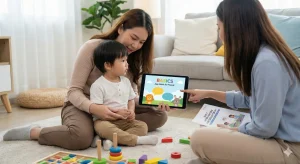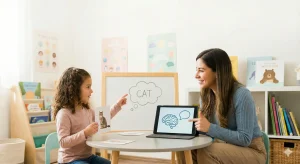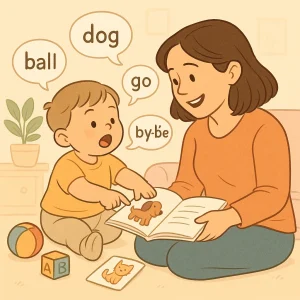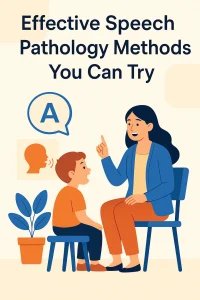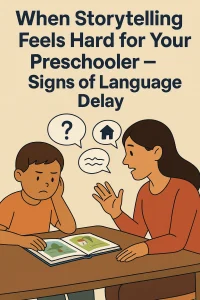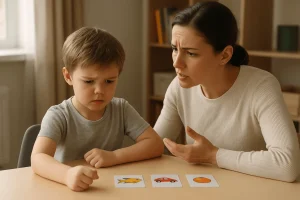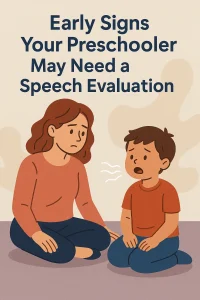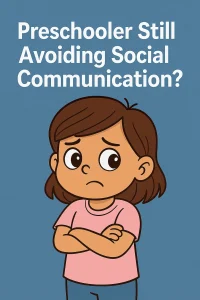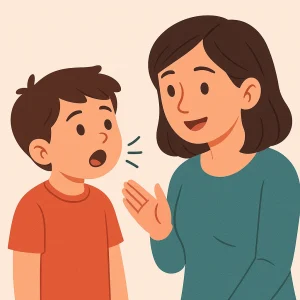Top Games for Early Childhood Language Development
By Wellness Hub
Last Updated: December 2, 2024
Games play a crucial role in early childhood language development, providing both fun and educational benefits. By engaging in interactive games, children not only expand their vocabulary but also enhance their literacy skills from a young age. This article explores top early childhood language games and activities that parents can easily incorporate into their child’s daily routine to foster robust language abilities, setting a strong foundation for future learning.
The Impact of Language Games: Key Statistics
Research highlights the powerful role of games in early childhood language development:
- 85% of brain development occurs by age 5, making early exposure to language-building activities crucial for long-term learning. (Source: Center on the Developing Child at Harvard University)
- Children exposed to interactive language games showed a 25% improvement in vocabulary acquisition compared to those who did not engage in such activities. (Source: Journal of Early Childhood Research)
- Studies suggest that daily playtime of 15–20 minutes with language-focused games can lead to a 30% increase in phonemic awareness by preschool age. (Source: National Institute for Literacy)
- Interactive storytelling has been shown to enhance language skills by 40% faster than traditional reading methods alone. (Source: Frontiers in Psychology)
These statistics underscore the importance of integrating language games into your child’s daily routine to maximize cognitive and linguistic growth.
The Role of Parents in Early Language Games
Parents greatly influence their children’s early language development. Regular interaction through simple language games can significantly boost a child’s vocabulary and early literacy skills. Here’s how parents can integrate these games into everyday life:
- Engage in storytelling: Encourage children to tell their own stories or recount their day, which helps them practice forming sentences and using new words.
- Label household items: Write names on stickers for common items around the house to build word-object association.
- Mealtime descriptions: Use mealtimes to describe foods’ colors, shapes, and textures to expand descriptive vocabulary.
- Play sound games: Introduce games focusing on sounds and rhymes, which are enjoyable ways to develop phonetic awareness.
Interactive Storytelling Games
Interactive storytelling games are a key component in early childhood language games, offering significant benefits for language development. They captivate young minds and introduce new vocabulary and concepts in a fun and engaging way—through stories. These games encourage children to actively participate in storytelling, which aids in understanding and contextualizing new words.
Examples of Interactive Storytelling Games for Early Childhood Language Development:
- Story Dice: Rolling dice that display pictures, children are prompted to create stories based on the images they see. This not only sparks creativity but also enhances narrative skills.
- Story Prompts: Using cards with characters, settings, and objects as prompts, children are encouraged to build their own stories. This introduces them to specific vocabulary and helps them connect words with corresponding images and concepts.
- Interactive Books: Select books that involve the child’s participation, such as those that ask questions or require decisions that influence the story’s outcome. This interaction deepens engagement and makes the learning process more dynamic.
Engaging with Labeling Games
Engaging with labeling games is a powerful component of early childhood language games, helping children learn essential word-object associations critical for language development. These activities boost a child’s ability to recognize and name various objects, laying a solid foundation for vocabulary building.
Practical Ways to Implement Labeling Games at Home:
- Home Scavenger Hunt: Create a list of items for your child to find and label around the house. This not only teaches new words but also turns learning into an exciting adventure. For example, you might ask your child to find something “soft” or something “red,” and then have them label it with the correct word.
- DIY Flashcards: Craft flashcards featuring pictures and words of common household items. Use these for a matching game where your child pairs the word with the correct item. This game reinforces word recognition and comprehension in a fun, interactive way.
- Sticker Labeling: Give your child stickers to write words on and stick to corresponding items around the home. This activity merges visual and physical learning, which helps solidify the connection between words and their meanings.
Exploring Picture Books as Language Tools
Exploring picture books as part of early childhood language games is a fantastic way to nurture a child’s language skills. These books provide visual stimulation that complements textual context, making them excellent tools for introducing new vocabulary and concepts. When children see images associated with words, they grasp meanings more quickly and improve their comprehension skills.
Tips on Using Picture Books to Enhance Vocabulary and Comprehension:
- Read Regularly: Establish reading as a daily activity. Choose a calm time for reading aloud to help your child concentrate on the story and absorb new words.
- Discuss the Pictures: Take breaks during reading to discuss the illustrations. Ask questions like, “What do you see in the picture?” or “What do you think is happening?” These questions stimulate your child’s imagination and enhance their understanding of the story and its context.
- Relate to Real Life: Link the events or items in the book with your child’s real-life experiences. This connection makes the learning experience more relevant and memorable, helping to solidify their understanding.
- Vocabulary Focus: Highlight new words and explain their meanings in simple terms. Return to these words in various contexts to reinforce your child’s learning and ensure they recognize these words outside the stories.
Creative Word Chain Activities
Word chains are a playful way to expand a child’s language skills. This activity involves linking words together based on their sounds or meanings, which helps improve vocabulary and linguistic creativity.
Steps to Create Word Chains with Children Using Everyday Items:
- Choose a Category: Start with a simple category that your child is familiar with, such as animals, colors, or food.
- Start Simple: Begin with a word your child knows well. For example, if the category is animals, you might start with “cat.”
- Build the Chain: Ask your child to think of another word that starts with the last letter of the previous word, such as “tiger” following “cat.”
- Expand the Game: Once your child gets the hang of it, introduce adjectives or verbs that describe the noun, like “tall” for “tiger.”
Role-Playing for Language Enrichment
Role-playing is a dynamic component of early childhood language games that significantly enhances language development in young children. It fuels the imagination, boosts expressive speech, and develops social skills through interactive scenarios. By participating in role-playing games, children learn to use language effectively and diversely as they adopt various roles, thereby expanding their vocabulary and understanding of how language operates within different contexts.
Ideas for Role-Play Scenarios to Enhance Early Childhood Language Games:
- Family Dinner: Transform playtime by setting up a dinner scenario where one child is the chef, another the waiter, and others are family members. They can use menus, take orders, and discuss the day’s specials, which helps expand their culinary vocabulary.
- Supermarket Shopping: Create a home supermarket where items are labeled in English. Children can use shopping lists to find items, ask about prices, and simulate transactions, which helps them learn and use money-related vocabulary.
- Doctor’s Office: Set up a doctor-patient role-play. Children can discuss symptoms, suggest treatments, and advise on health practices, using medical terminology in a fun and engaging way.
- School Classroom: Allow children to take turns being the teacher or students in a classroom setup. The ‘teacher’ can lead a lesson, pose questions, and manage the classroom, promoting the use of educational language in a natural setting.
Incorporating Technology in Language Learning
Modern technology offers a plethora of tools that can significantly enhance language learning for children. Educational apps and videos are designed to be interactive and can capture a child’s attention much longer than traditional learning methods.
Useful Technological Resources for Language Learning:
- Educational Videos: Platforms like YouTube Kids feature countless educational channels that provide lessons in phonics, vocabulary, and conversational English through captivating animations and stories.
- E-books and Story Apps: Digital books not only tell stories but also highlight words as they are read aloud, helping children associate sounds with text.
- Interactive Whiteboards and Learning Games: Tools like the Wellness Hub’s Synchronized Whiteboard enhance engagement through visual and auditory learning experiences, ideal for language development.
Strategies for Maximizing Game Benefits
Choosing the right games for your child’s development and creating a balanced play routine are crucial steps in fostering both educational and social skills. Here are some strategies to help you maximize the benefits of game-based learning, ensuring your child gains the most from their playtime.
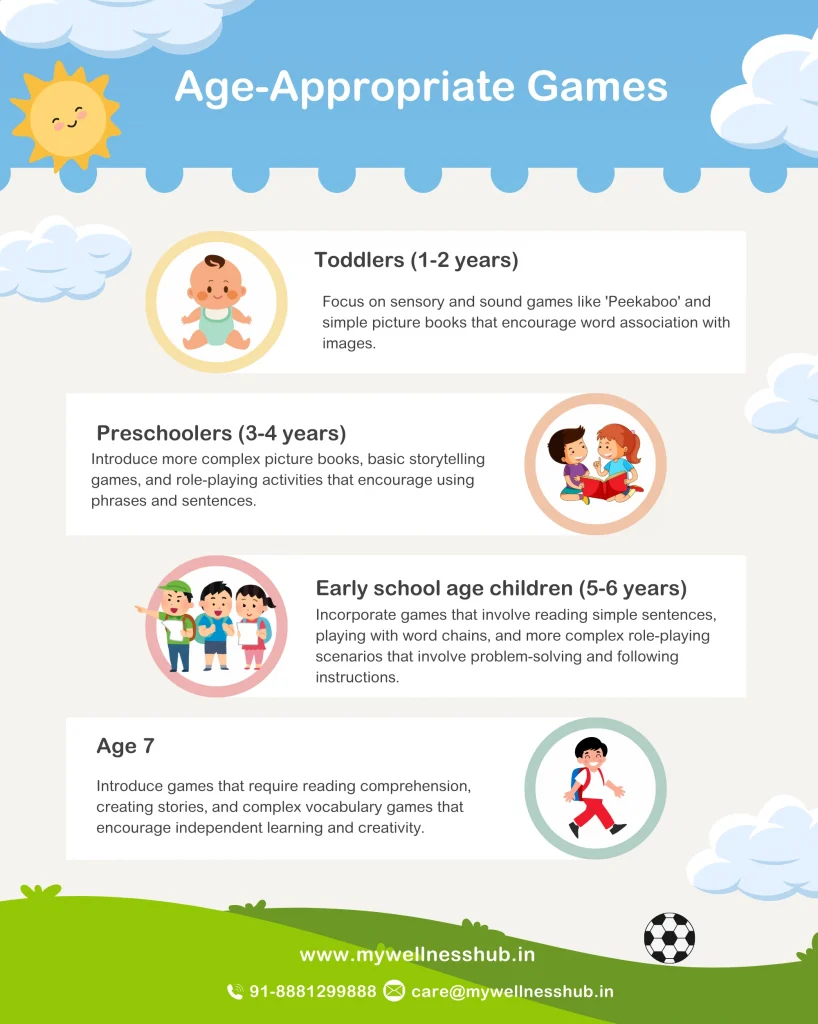
Choosing the Right Games for Different Age Groups:
- Toddlers (1-3 Years): Opt for games that involve basic sorting of shapes and colors, simple puzzles, and interactive books. These games help toddlers develop fine motor skills and begin to recognize patterns and sequences.
- Preschoolers (3-5 Years): Choose games that encourage more complex problem solving, early math skills, and vocabulary development. Story-based games or those that involve role-playing can be particularly beneficial for enhancing language skills.
- Early School Age (5-7 Years): Focus on games that support reading and writing skills, basic arithmetic, and scientific inquiry. Educational video games that offer adaptive learning features are particularly effective for this age group.
Creating a Balanced Routine:
- Schedule Regular Playtimes: Consistency is key. Set aside regular daily or weekly times for both educational and free play. This routine helps children look forward to their playtime and prepares them mentally for engaging activities.
- Mix Structured and Free Play: While structured play is great for learning specific skills, free play encourages creativity and social development. Allow your child to lead the play sometimes, choosing their games and directing the course of the activity.
- Incorporate Physical Activity: Ensure games that require physical movement are part of the routine. Activities like playing catch, jumping rope, or even interactive video games that require physical involvement can help improve physical health and motor skills.
- Use Technology Wisely: Incorporate educational technology like apps and interactive games, but be mindful of screen time. Tools like those offered at Wellness Hub can enrich your child’s learning experience when used appropriately.
Conclusion
Choosing the right games is essential for nurturing your child’s language development during their early years. These fun activities are foundational tools that boost their ability to communicate and learn. By incorporating games into your daily routine, you support your child’s growth in a playful and effective way. Explore more engaging and educational games on Wellness Hub, where you can find the perfect resources to enrich your child’s learning experience. Remember, playing together isn’t just fun—it’s a crucial part of their development. Let’s make every playtime count!
Frequently Asked Questions:
1. What types of games are best for early language development?
Games that involve active participation and communication are excellent for early language development. These include storytelling games where children can create and narrate their own stories, role-playing games that simulate real-life interactions, and board games that involve word or picture matching. These games help children practice new words, understand the structure of language, and develop listening skills.
2. How can I use role-playing to improve my child’s language skills?
Role-playing games allow children to simulate different roles and scenarios, which can expand their vocabulary and improve their conversational skills. For example, playing ‘house’ can introduce terms related to everyday activities, while pretending to be a doctor or a shopkeeper can introduce vocabulary related to professions. Encourage your child to express thoughts and make decisions within their role, which enhances their ability to use language in varied contexts.
3. Are digital games good for language learning in young children?
Digital games designed for educational purposes can significantly aid language learning. Look for apps that promote vocabulary development, grammar, and pronunciation. Interactive games that provide feedback and adjust difficulty based on the child’s responses can be particularly effective. However, it’s important to balance screen time with physical play and human interaction to support overall development.
4. What everyday activities can help with my child’s language development?
Daily activities that involve talking, reading, and playing can all enrich your child’s language skills. Talk through your daily routines, ask questions, and encourage your child to describe their experiences and surroundings. Reading together builds vocabulary and comprehension, while simple games like ‘I spy’ or sorting games can teach new words and concepts.
5. How often should I play language development games with my child?
Daily play that includes language-focused games is ideal. Even short sessions of about 10-15 minutes can be beneficial, especially for younger children. Consistency helps reinforce new skills and keeps the learning process enjoyable and engaging.
6. Can reading picture books improve my child’s language abilities?
Yes, picture books are a fantastic tool for language development. They introduce children to a rich vocabulary and complex sentence structures, more so than everyday conversation. Discussing the story and asking predictive questions can also improve critical thinking and narrative skills.
7. What age should I start language development games with my child?
It’s never too early to start language development games. For infants, simple games involving sounds and songs help with early language recognition. As children grow, more complex games that involve rules and storytelling can be introduced to gradually build their language skills.
8. How do I choose the right educational games for my child?
Choose games that match your child’s developmental stage and interests. For toddlers, games that involve simple words and pictures are best. Preschoolers might enjoy games that involve more complex sentences and role-play. Always ensure that the games are engaging and fun, as children learn best when they are enjoying themselves.
9. What are the benefits of incorporating technology into language learning?
Technology can offer interactive experiences that are difficult to replicate with physical games alone. Many apps are designed to adapt in difficulty based on the user’s responses and can provide immediate feedback. They can also expose children to a wider range of vocabulary and accents than they might hear in their home environment.
10. Where can I find resources for language development games?
Websites like Wellness Hub offer a variety of resources, including recommendations for both physical and digital language development games. Libraries and educational apps are also great sources for finding age-appropriate games and activities that support language learning.
About the Author:
Rajini Darugupally
M.Sc., Speech-Language Pathologist (9+ years of experience)
Rajini is a passionate and dedicated Speech-Language Pathologist with over 9+ years of experience, specializing in both developmental speech and language disorders in children and rehabilitation in adults. Currently, at Wellness Hub, she thrives in a team environment that values innovation, compassion, and achieving results for their clients.
Book your Free Consultation Today
Parent/Caregiver Info:
Client’s Details:
* Error Message
